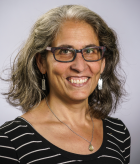Joan Ostrove
Contact
PsychologyOlin/Rice Halls of Science Room 321 651-696-6223
conrod@macalester.edu
facebook instagram

Professor of Psychology
Psychology and Social Structure
Olin-Rice Science Center, 325
651-696-6775
ostrove@macalester.edu
Joan Ostrove’s research concerns the connections between individual psychology and social structure. She is interested in the ways in which our positions in the social structure (specifically with respect to gender, social class, race, and disability), and at particular historical moments, shape our individual psychological experiences. Joan Ostrove is currently examining what the qualities of effective alliances across differences of social identity are (e.g., alliances between people of color and white people, between people with disabilities and non-disabled people, and between Deaf and hearing people). In particular, she is interested in the qualities that members of non-dominant groups look for in a potential dominant-group ally.
Education
BA: Williams College
PhD: University of Michigan
Certificate in Women’s Studies: University of Michigan
Selected publications
Wang, K., Manning, R. B., Bogart, K. R., Adler, J. M., Nario-Redmond, M. R., Ostrove, J. M., & Lowe, S. R. (in press). Predictors of depression and anxiety among adults with disabilities during the COVID-19 pandemic. Rehabilitation Psychology.
Gillen-O’Neel, C., *Roebuck, E., & Ostrove, J. M. (2021). Class and the classroom: The role of individual- and school-level socioeconomic factors in predicting college students’ academic behaviors. Emerging Adulthood. 10.1177/2167696818815359
Ostrove, J. M., *Kornfeld, M, & *Ibrahim, M. (2019). Actors against ableism?: Qualities of non-disabled allies from the perspective of people with physical disabilities. Journal of Social Issues, 75, 924-942.
Oliva, G., Lytle, L., Hopper, M., Ostrove, J. (2016). From social periphery to social centrality: Building social capital for deaf and hard-of-hearing students in the 21st century. In M. Marschark, V. Lampropoulou, & E. Skordilis (Eds.), Diversity in deaf education (pp. 325-354). NY: Oxford University Press.
Brown, K. T. & Ostrove, J. M. (2013). What does it mean to be an ally?: The perception of allies from the perspective of people of color. Journal of Applied Social Psychology, 43, 2211-2222.
Ostrove, J. M., & Rinaldi, J. (2013). Co-editors of Volume 33, Number 2 of Disability Studies Quarterly on “Self-reflection as scholarly praxis: Researcher identity in Disability Studies”
*denotes Macalester student